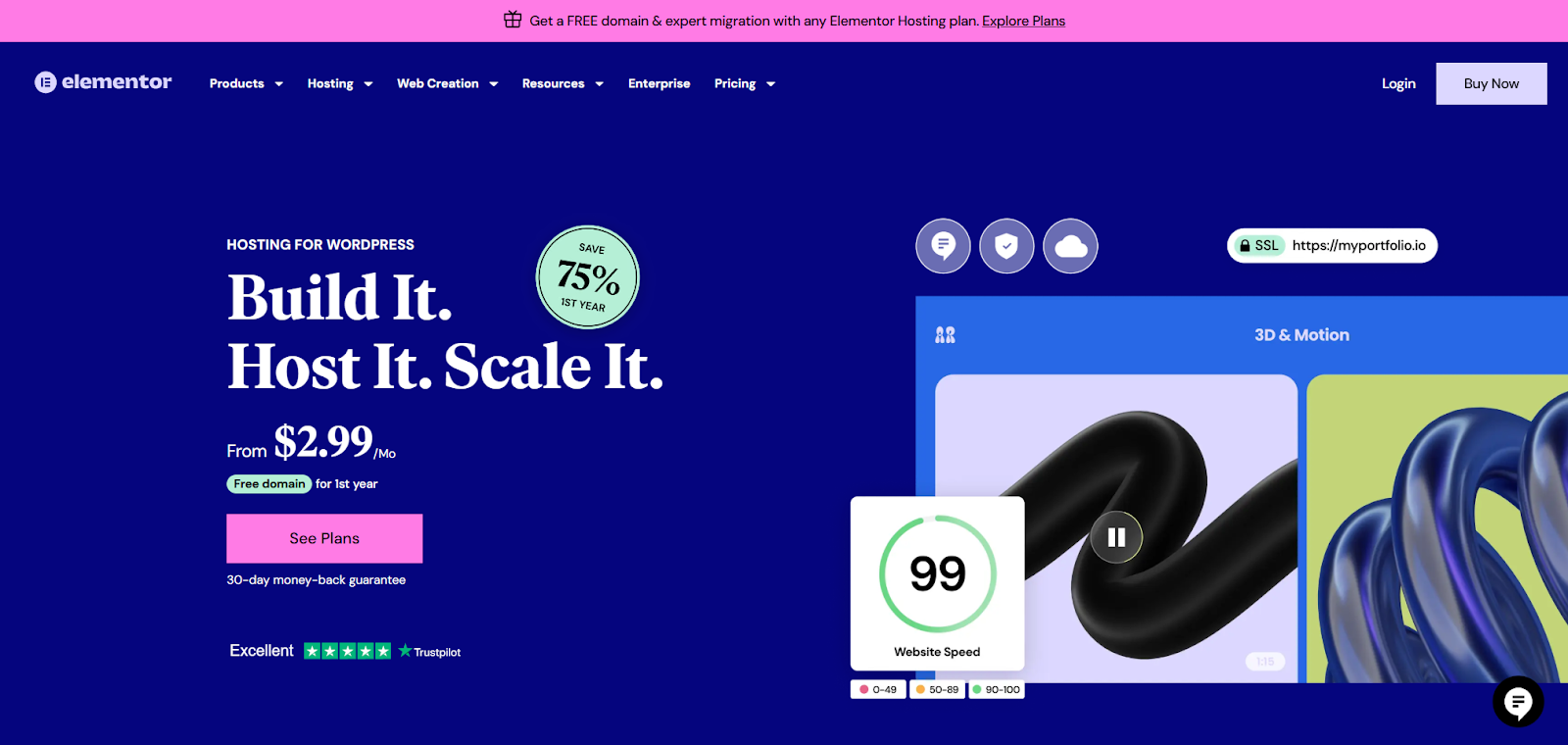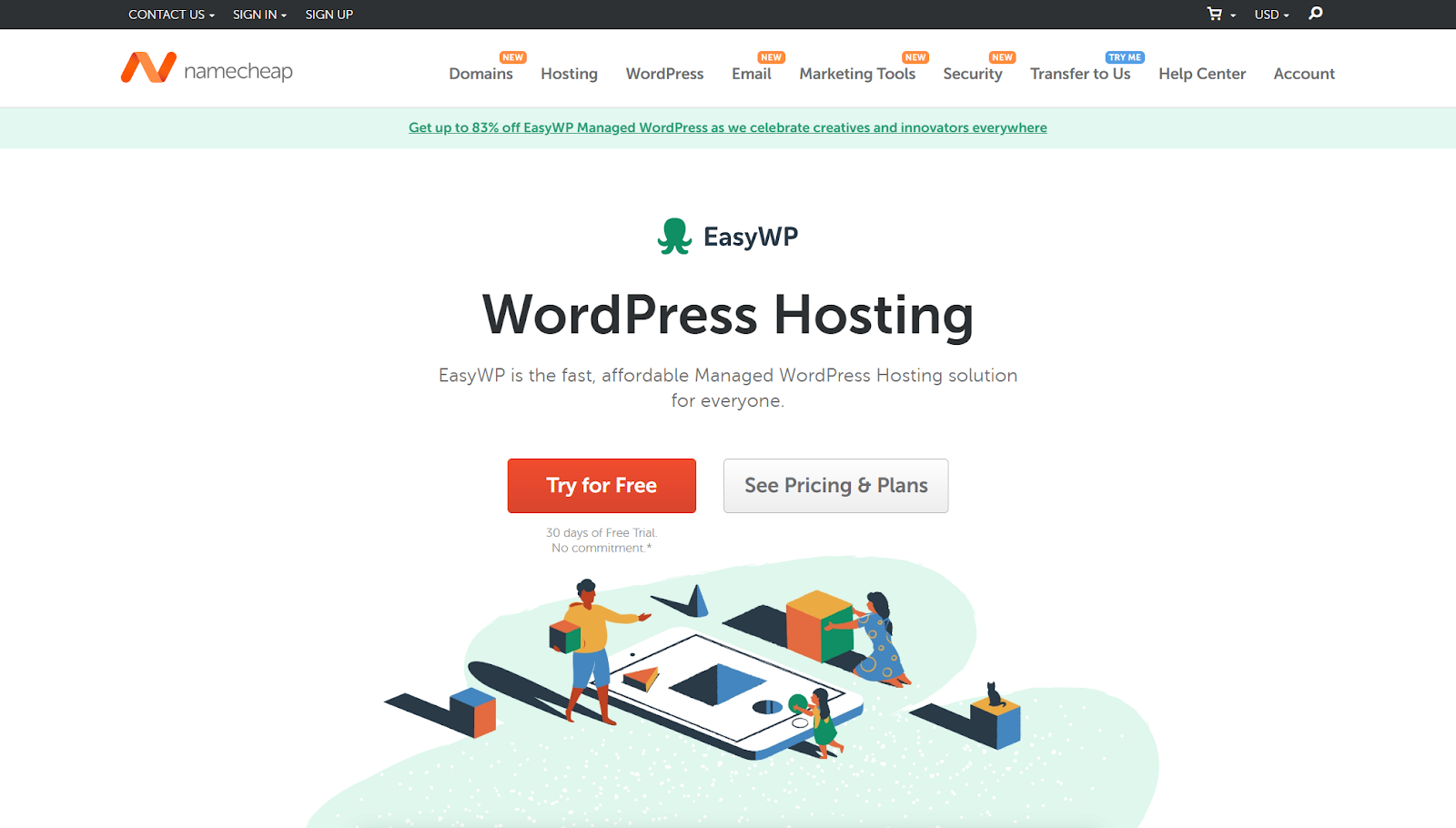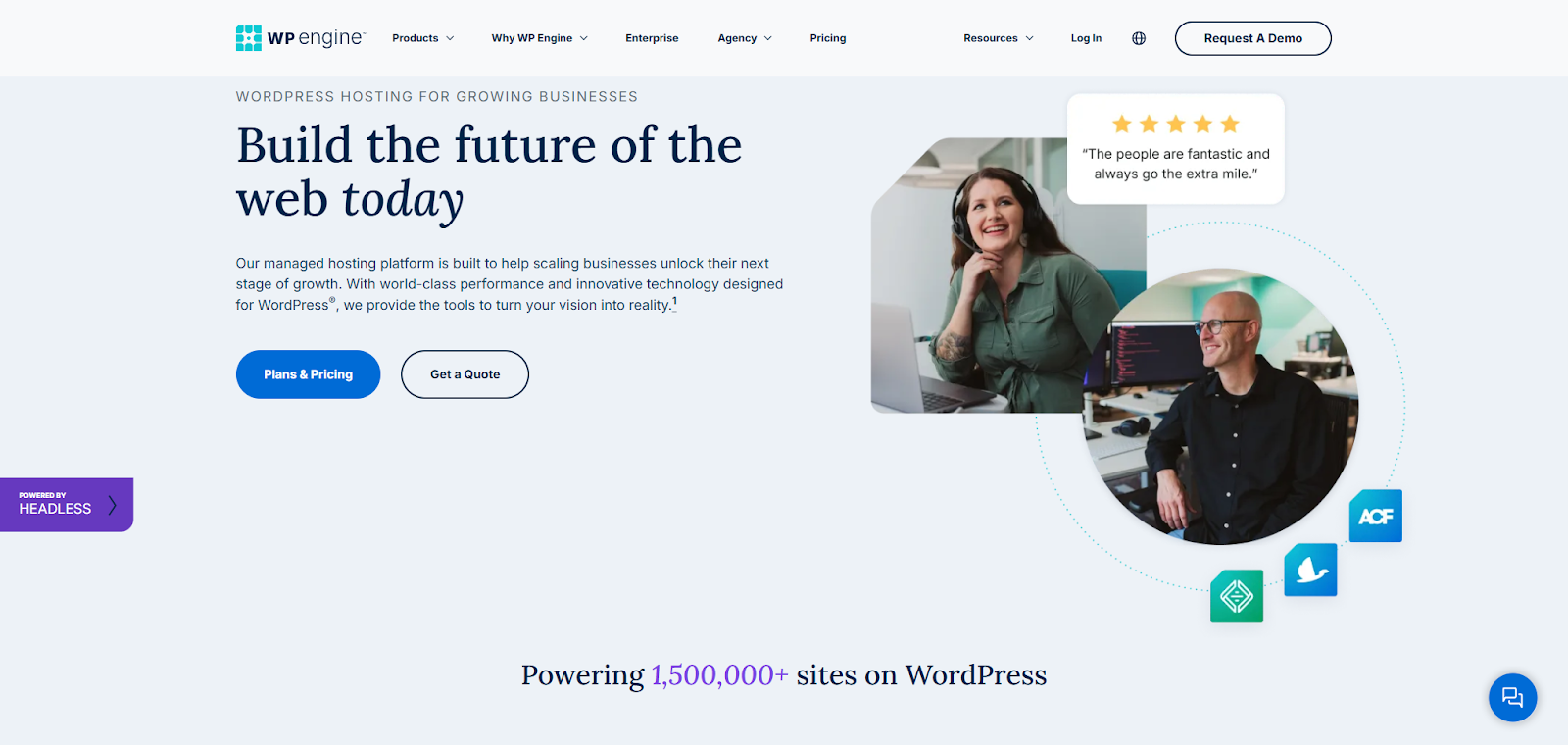Table of Contents
Choosing the right web hosting provider is a big decision. It’s the foundation of your online presence. The host you pick affects your website’s speed, security, and how easy it is to manage. With so many options available, how do you find the perfect fit for your WordPress site?
This article explores three popular choices: WP Engine, Namecheap, and Elementor Hosting. We will examine what each offers to help you make an informed decision for your website’s needs in 2026.
WP Engine vs Namecheap vs Elementor Hosting in 2026: An Overview
Let’s start with a quick look at these three hosting providers. They serve different needs and priorities within the WordPress world.
Elementor Hosting: The All-in-One Solution for WordPress Websites

Elementor Hosting is built specifically for WordPress and Elementor users. Think of it as a smooth experience where your hosting and website builder work together seamlessly.
What You Get:
- Managed WordPress Hosting: It handles the technical details. WordPress comes pre-installed, which saves you setup time.
- Elementor Core Included: Every Elementor Hosting plan includes the Elementor Core builder (the free version) ready to use. This means you can start designing with the familiar drag-and-drop interface right away. Please note: Using Elementor Pro features still requires a separate Elementor Pro plugin license.
- Google Cloud Power: Your site runs on Google Cloud Platform’s premium tier (C2 machines). This provides excellent speed, reliability, and the ability to handle traffic spikes using auto-scaling.
- Speed Enhancements: You get fast NVMe SSD storage, which is much quicker than older SSDs. It also includes Cloudflare Enterprise CDN to deliver your content quickly to visitors around the world.
- Strong Security: Security is a priority. Elementor Hosting gives you free SSL certificates (which auto-renew), daily automatic backups, a Web Application Firewall (WAF), DDoS protection, and active monitoring. Your site runs in its own isolated environment for added protection.
- Integrated Management: You can manage your hosting and website directly from your Elementor dashboard. This simplifies your workflow.
- Expert Support: The support team understands both hosting and Elementor. If you face issues related to how Elementor works with your hosting, experts are ready to help 24/7.
Who is it Best For?
Elementor Hosting is ideal for freelancers, agencies, and businesses who primarily build websites with Elementor. If you value convenience, performance tuned for Elementor, and an integrated workflow, it’s a strong choice. The all-in-one approach simplifies managing your online presence.
Elementor Hosting offers a managed, secure, and high-performance environment optimized for WordPress sites built with Elementor. It runs on Google Cloud infrastructure and includes integrated, expert support.
Namecheap: Affordable Hosting and Domain Management

Namecheap earned its reputation with affordable domain registration and has grown significantly in the hosting market. People often choose it when starting out or working with tighter budgets.
What You Get:
- Variety of Hosting Types: Namecheap provides shared hosting, managed WordPress hosting (EasyWP), VPS hosting, and dedicated servers. This range serves different needs and stages of growth.
- Affordability: Their shared hosting plans are very budget-friendly, often featuring attractive introductory prices. Even their managed WordPress options offer competitive pricing.
- Domain Services: As a major domain registrar, managing your domains and hosting in one place can be handy. They often include a free domain name for the first year with hosting plans.
- User-Friendly Control Panel: Most Namecheap plans use cPanel. This is a standard and widely known hosting control panel, making it fairly easy for users to manage files, databases, and email accounts.
- Included Features: Even budget plans often come with free SSL certificates, website migration help, and their Supersonic CDN on certain tiers.
- Security Basics: Features like DDoS protection, firewalls, and regular backups (how often depends on the plan) are part of the package. They also offer options like domain privacy (WhoisGuard).
Who is it Best For?
Namecheap is a solid option for beginners, bloggers, small businesses, and anyone very mindful of their budget. If you need basic, reliable hosting without needing advanced, high-performance features, or if you want to manage domains and hosting together affordably, Namecheap deserves consideration.
Namecheap provides a wide range of affordable hosting solutions. It’s particularly strong in shared hosting and domain registration, making it accessible for beginners and budget-focused users.
WP Engine: Premium Managed WordPress Hosting

WP Engine concentrates only on managed WordPress hosting. It positions itself as a premium provider for businesses and users who need top-level performance, security, and support.
What You Get:
- Managed WordPress Expertise: Everything is tuned for WordPress. They manage core updates, security patches, and performance adjustments specifically for the platform.
- High Performance: WP Engine is known for speed. They use technologies like their own EverCache caching system, an integrated global CDN, and optimized server infrastructure to ensure fast load times.
- Strong Security: Security is a major focus. They provide a managed WAF, DDoS mitigation, active threat detection, and free SSL certificates. They even offer a security guarantee – if your site gets hacked, they promise to fix it for free.
- Developer-Friendly Tools: WP Engine includes features valuable for developers and agencies. These include one-click staging environments (to test changes safely), Git integration for version control, and SSH access.
- Expert WordPress Support: Their support team is made up of WordPress experts available 24/7 via chat and phone (depending on the plan). They can assist with complex WordPress-specific problems.
- Premium Themes Included: WP Engine plans come with access to the Genesis Framework and premium StudioPress themes at no extra charge.
Who is it Best For?
WP Engine aims at businesses, high-traffic websites, agencies, and developers who prioritize performance, security, and expert support and are willing to pay more for it. If WordPress is vital to your business and you want a hands-off, high-performance managed solution, WP Engine is a leading option.
WP Engine offers premium, high-performance managed WordPress hosting. It features strong security, developer-focused tools, and expert support, making it suitable for businesses and important websites.
Selecting the Best Hosting Plan for You
Okay, we have reviewed the providers. But how do you pick the right plan for your specific situation? It involves looking at several key factors.
Hosting Tuned for WordPress/WooCommerce
Is your website built on WordPress? Or maybe it’s an online store using WooCommerce? Using hosting specially optimized for these platforms truly helps. Managed WordPress hosts adjust servers, caching, and security precisely for how WordPress functions. This usually results in better performance and fewer problems compared to generic hosting.
Define Your Website’s Hosting Needs
Think honestly about your website:
- Traffic: How many visitors do you expect now? How many might you have later? Hosting plans often limit monthly visits or bandwidth.
- Size & Complexity: Is it a simple blog or a large e-commerce site with many plugins and complex functions? More complex sites require more server resources (like CPU and RAM).
- Storage: How much space do your website files, images, videos, and databases require?
Understanding these points helps you choose a plan with enough resources without paying too much.
Planning Hosting for Future Site Growth
Your website might be small today, but what about next year? Select a host that allows you to easily scale your resources. Can you upgrade your plan smoothly as your traffic increases? Cloud-based hosting platforms (like the Google Cloud infrastructure used by Elementor Hosting) often provide seamless scaling. Avoid getting stuck with a plan that cannot grow with your site.
Managing Your Web Hosting Budget Wisely
Hosting costs can differ greatly. While cheap plans look attractive, think about the overall value.
- Compare Renewal Rates: Initial prices might be low, but always check the cost when the plan renews.
- Included Features: Does the price cover essentials like SSL, CDN, backups, staging, and email? Sometimes a slightly higher-priced plan gives better value by including these features.
- Long-Term Value: Consider the cost of downtime or slow website speeds. Investing a bit more in reliable hosting can actually save money over time.
Why Hosting Reliability & Uptime Matter
Uptime is the percentage of time your website is online and reachable. Even 99% uptime means your site could be down for over 7 hours each month! Look for providers promising 99.9% uptime guarantees or better. Downtime translates to lost visitors, lost sales, and harm to your reputation. Reliability is essential.
Faster Speeds with NVMe Server Storage
The type of storage affects speed. Older Hard Disk Drives (HDDs) are slow. Standard Solid State Drives (SSDs) are much faster. But the newest NVMe SSDs (Non-Volatile Memory Express) provide another big jump in performance. Hosts using NVMe storage, such as Elementor Hosting, offer quicker data access. This leads to faster page loads and a more responsive website backend.
The Value of 24/7 Expert Hosting Support
When problems occur (and they sometimes do), you need help quickly. Look for providers offering 24/7 support through various methods (chat, email, phone). More importantly, is the support team knowledgeable? For WordPress sites, having access to WordPress experts (like WP Engine provides) or experts familiar with your specific tools (like Elementor Hosting’s support) is extremely valuable.
Need for an Easy-to-Use Control Panel
You will need to manage parts of your hosting account – perhaps setting up email, accessing backups, or handling databases. A user-friendly control panel makes these tasks much simpler. Common options include cPanel (used by Namecheap) or custom dashboards (like those from Elementor Hosting and WP Engine) designed for a more integrated feel.
Evaluate your specific WordPress needs, plan for growth, balance budget with value, prioritize reliability, check storage technology, demand good support, and ensure easy management.
Key Factors for Smooth Hosting Migration
Moving your website from one host to another might seem scary, but good planning makes it easier.
Understanding the Data Transfer Steps
Basically, migration means copying your website files (themes, plugins, uploads) and your database (posts, pages, settings) from your old host to the new one. Many hosts provide migration tools or services to assist you. If you do it manually, you’ll likely use FTP/SFTP for files and tools like phpMyAdmin for the database.
Handling Your Domain Name During Moves
Your domain name must point to the new server’s address. You do this by updating your DNS (Domain Name System) records, specifically the A record or CNAME record. This change happens at your domain registrar (where you purchased the domain). There will be a time called propagation while the change spreads across the internet (usually a few hours, but sometimes up to 48).
Choosing Where to Host Your Emails
Your website hosting and email hosting do not need to be with the same company. If your new host doesn’t offer email, or if you prefer a dedicated email service (like Google Workspace or Microsoft 365), you will need to update your domain’s MX records (Mail Exchanger) to point to your email provider.
Tips to Prevent Downtime When Migrating
- Plan Carefully: Pick a time with low traffic for the final switch.
- Test Thoroughly: Use a temporary URL or staging site from the new host to test everything before you update your DNS.
- Lower DNS TTL: Before changing DNS records, lower the TTL (Time To Live) setting on your current DNS records. This helps the DNS change spread faster.
- Keep Old Hosting Active: Do not cancel your old hosting right away. Keep it active for a few days after switching, just in case you need to go back.
Using Simple One-Click Migration Tools
Many WordPress-focused hosts, including Elementor Hosting and WP Engine, offer free or automated migration plugins or tools. These greatly simplify the process by handling the file and database transfer for you. Always check if your new host offers such a tool.
Back up everything, transfer files and database, test completely on the new host, update DNS, and think about using host-provided migration tools for an easier move.
Boosting Site Performance on New Hosting
You’ve moved! Now, let’s ensure your site runs as fast as possible on its new home.
Actionable Performance Tuning Tactics
- Optimize Images: Large images make sites slow. Use tools to compress images without losing quality and select the right formats (like WebP).
- Minify Code: Remove unneeded characters (whitespace, comments) from CSS and JavaScript files. Many caching plugins can handle this.
- Limit External Scripts: Too many third-party scripts (for analytics, ads, social media buttons) can slow loading. Use only the essential ones.
- Update Everything: Keep WordPress core, themes, and plugins current. Updates often bring performance improvements.
Using Caching & CDN for Faster Loading
- Caching: This stores frequently used versions of your site’s parts (pages, database results) so they don’t need to be created from scratch each time. Good hosts (like WP Engine with EverCache or Elementor Hosting) provide server-level caching. You can also use WordPress caching plugins.
- CDN (Content Delivery Network): A CDN saves copies of your static files (images, CSS, JS) on servers globally. When someone visits your site, they download these files from the server nearest them, reducing delay. Hosts like Elementor Hosting include a powerful CDN (Cloudflare Enterprise).\
Gains from Cloud Infrastructure Hosting
Hosting platforms built on cloud infrastructure (like Google Cloud, which Elementor Hosting uses) offer major benefits:
- Scalability: Easily manage traffic surges by automatically assigning more resources.
- Reliability: Cloud platforms have built-in backup systems, lessening the risk of downtime from hardware failure.
- Global Reach: Data centers around the world mean faster loading for international visitors.
Essential Regular Maintenance Routines
- Database Optimization: Regularly clean your WordPress database (remove old post revisions, spam comments, temporary data). Plugins can help automate this task.
- Check for Errors: Monitor your site for broken links or server issues.
- Performance Testing: Periodically run speed tests (like Google PageSpeed Insights) to find new performance problems.
Optimize images and code, use caching and CDNs effectively, benefit from cloud infrastructure, and perform regular maintenance for lasting speed.
Essential Web Hosting Security Measures
A fast site is important, but a secure site is vital. Your host helps a lot, but you also have responsibilities.
- Secure Hosting Foundation: Pick a host that puts security first (like Elementor Hosting or WP Engine). They use server-level protections you might not manage yourself.
- SSL Certificates (HTTPS): This encrypts data between your site and visitors. It’s crucial for trust and SEO. Most good hosts offer free SSL (like Let’s Encrypt). Make sure it’s active and forces HTTPS connections.
- Strong Passwords & Access Control: Use complex, unique passwords for WordPress admin, hosting accounts, FTP, and databases. Give administrator access only to those who truly need it. Set up Multi-Factor Authentication (MFA) whenever possible.
- Web Application Firewall (WAF): This acts like a filter. It blocks harmful traffic and common web attacks before they reach your site. Many managed hosts (Elementor Hosting, WP Engine) include a WAF.
- Regular Backups: Your host should offer automatic daily backups (Elementor Hosting and WP Engine do). Know how to access and restore them. Think about keeping your own backups off-site too.
- Malware Scanning & Removal: Good hosts often scan for malware. Have a plan or use a security plugin to scan regularly and clean any infections.
- Keep Software Updated: Outdated WordPress core, themes, or plugins are big security risks. Update them quickly. Look for hosts that offer automatic updates or patch management.
- Limit Login Attempts: Stop brute-force attacks by limiting failed login tries. Security plugins can help with this.
- Secure File Transfer (SFTP/SSH): Avoid using standard FTP because it sends passwords unencrypted. Use encrypted SFTP or SSH instead.
- DDoS Protection: Distributed Denial of Service attacks can flood your server. Hosts like Elementor Hosting and WP Engine include DDoS protection.
- Regular Security Checks: Periodically review your site’s security settings and user roles.
- Use Dev/Stage/Prod Environments: Test updates and changes in a safe staging environment (offered by hosts like WP Engine and on some Elementor Hosting plans) before applying them to your live website.
Begin with a secure host, use SSL, strong passwords/MFA, WAF, backups, updates, malware scans, limit logins, use secure file transfers, and test changes safely.
What’s Next for the Web Hosting Industry?
The hosting world changes constantly. Here are a few trends shaping its future:
- AI & Automation: AI helps optimize server performance, improve security threat detection, automate customer support, and even manage server resources more efficiently.
- Cloud & Edge Computing: Cloud hosting keeps growing, offering scalability and reliability. Edge computing processes data closer to the user, reducing delays for web applications.
- Sustainability (Green Hosting): There’s more focus on environmental impact. More data centers use renewable energy and energy-saving technologies. Providers are promoting their eco-friendly efforts.
- Containerization & Serverless: Technologies like Docker (containers) and serverless computing allow for better resource use, faster deployment, and easier application scaling. This influences how hosting platforms are designed.
- Enhanced Security Focus: Due to rising cyber threats, expect even better security measures like advanced WAFs, AI-powered threat intelligence, and stronger identity management built into hosting.
Expect more AI, cloud/edge use, focus on sustainability, new deployment methods, and constantly improving security in the hosting industry.
Conclusion: Making the Right Choice
Choosing between WP Engine, Namecheap, and Elementor Hosting—or any hosting provider—really depends on your specific needs, priorities, and budget.
- Namecheap gives an affordable starting point with solid basic hosting and domain services at a low price.
- WP Engine provides a premium, high-powered, secure setup for important WordPress sites that need top performance and expert help.
- Elementor Hosting offers an attractive all-in-one package made specifically for Elementor users. It balances performance (using Google Cloud), security, ease of use, and integrated, knowledgeable support.
Think about your website’s current needs, your plans for growth, how much technical work you want to handle, and the level of performance and security you require. By carefully looking at the factors discussed here—performance, security, scalability, support, and budget—you can confidently choose the hosting provider that will best support your online success in 2026 and beyond.
Looking for fresh content?
By entering your email, you agree to receive Elementor emails, including marketing emails,
and agree to our Terms & Conditions and Privacy Policy.





